United States Attorney for the Southern District of New York
 | |
| Department overview | |
|---|---|
| Formed | September 24, 1789 by the Judiciary Act of 1789 |
| Jurisdiction | Southern District of New York |
| Headquarters | Manhattan, New York City, New York, U.S. |
| Department executive |
|
| Parent Department | United States Department of Justice |
| Website | justice |
| Map | |
 Southern District of New York | |
The United States attorney for the Southern District of New York is the chief federal law enforcement officer in eight contiguous New York counties: the counties (coextensive boroughs of New York City) of New York (Manhattan) and Bronx, and the counties of Westchester, Putnam, Rockland, Orange, Dutchess, and Sullivan. Established by the Judiciary Act of 1789, the office represents the United States government in criminal and civil cases across the country. The SDNY handles a broad array of cases, including but not limited to those involving white collar crime, domestic terrorism, cybercrime, public corruption, organized crime, and civil rights disputes.
The Southern District has earned itself the moniker the "Sovereign District of New York".[1][2] Its resources, culture, and accompanying FBI field office have given the SDNY a reputation for being exceptionally aggressive in its pursuit of criminals.[3][4] Due to its jurisdiction over the New York City borough of Manhattan, the preeminent financial center of the United States of America, the office's incumbent is often nicknamed the "Sheriff of Wall Street".[5]
As of October 10, 2021[update], the United States attorney is Damian Williams.[6]
Organization
[edit]The office is organized into two divisions handling civil and criminal matters. The Southern District of New York also has two offices: in Manhattan and White Plains. The office employs approximately 220 assistant U.S. attorneys.[7]
List of U.S. attorneys
[edit]In 1814, the District of New York was divided into the Northern and the Southern District.[8]
| Term | U.S. Attorney | Party | Appointed by | |||
|---|---|---|---|---|---|---|
| 1 | April 1815 – July 1819 |

|
Jonathan Fisk | Democratic-Republican | James Madison | |
| 2 | July 1819 – February 1828 |
Robert L. Tillotson | Democratic-Republican | James Monroe | ||
| 3 | February 1828 – April 1829 |
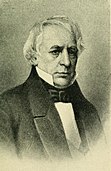
|
John Duer | Democratic-Republican | John Quincy Adams | |
| 4 | April 1829 – April 1834 |

|
James A. Hamilton | Democratic | Andrew Jackson | |
| 5 | April 1834 – December 10, 1838 |
William M. Price | Democratic | |||
| 6 | December 1838 – March 1841 |
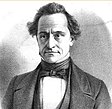
|
Benjamin F. Butler | Democratic | Martin Van Buren | |
| 7 | March 1841 – March 1845 |
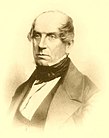
|
Ogden Hoffman | Whig | William Henry Harrison | |
| 8 | March 1845 – September 1848 |

|
Benjamin F. Butler | Democratic | James Polk | |
| 9 | September 1848 – December 1848 |
Charles McVean | Democratic | |||
| 10 | January 1849 – April 1849 |

|
Lorenzo B. Shepard | Democratic | ||
| 11 | April 1849 – March 1853 |

|
Jonathan Prescott Hall | Whig | Zachary Taylor | |
| 12 | April 1853 – June 1854 |
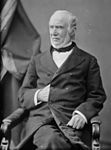
|
Charles O'Conor | Democratic | Franklin Pierce | |
| 13 | July 1854 – January 1858 |
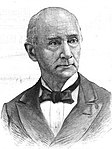
|
John McKeon | Democratic | ||
| 14 | January 1858 – December 1859 |

|
Theodore Sedgwick | Democratic | James Buchanan | |
| 15 | December 1859 – March 1861 |

|
James I. Roosevelt | Democratic | ||
| 16 | April 1861 – April 1865 |

|
Edward Delafield Smith | Republican | Abraham Lincoln | |
| 17 | April 1865 – April 12, 1866 |
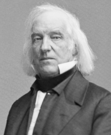
|
Daniel S. Dickinson | Democratic | ||
| 18 | April 1866 – April 25, 1869 |
Samuel G. Courtney | Democratic | Andrew Johnson | ||
| 19 | April 25, 1869 – July 20, 1870 |

|
Edwards Pierrepont | Republican | Ulysses S. Grant | |
| 20 | July 20, 1870 – December 31, 1872 |
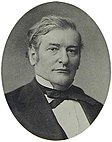
|
Noah Davis | Republican | ||
| 21 | December 31, 1872 – January 24, 1877 |
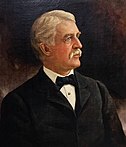
|
George Bliss Jr. | Republican | ||
| 22 | January 24, 1877 – March 12, 1883 |

|
Stewart L. Woodford | Republican | ||
| 23 | March 12, 1883 – July 6, 1885 |

|
Elihu Root | Republican | Chester A. Arthur | |
| 24 | July 6, 1885 – March 1, 1886 |
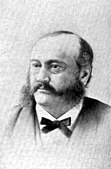
|
William Dorsheimer | Democratic | Grover Cleveland | |
| 25 | March 1, 1886 – September 16, 1889 |

|
Stephen A. Walker | Democratic | ||
| 26 | September 16, 1889 – February 1, 1894 |

|
Edward Mitchell | Republican | Benjamin Harrison | |
| February 1, 1894 – July 23, 1894 |

|
Henry C. Platt[a] | Democratic | Grover Cleveland | ||
| 27 | July 23, 1894 – January 1898 |
Wallace Macfarlane | Democratic | |||
| 28 | January 1898 – January 1906 |

|
Henry Lawrence Burnett | Republican | William McKinley | |
| 29 | January 1906 – April 8, 1909 |
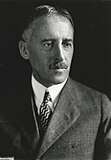
|
Henry L. Stimson | Republican | Theodore Roosevelt | |
| 30 | April 8, 1909 – May 7, 1913 |

|
Henry A. Wise | Republican | William Howard Taft | |
| 31 | May 7, 1913 – April 1917 |

|
Hudson Snowden Marshall | Democratic | Woodrow Wilson | |
| 32 | April 1917 – June 1921 |
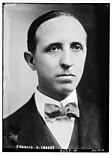
|
Francis Gordon Caffey | Democratic | ||
| 33 | June 1921 – March 2, 1925 |

|
William Hayward | Republican | Warren Harding | |
| 34 | March 2, 1925 – April 6, 1927 |

|
Emory Buckner | Republican | Calvin Coolidge | |
| 35 | April 6, 1927 – September 29, 1930 |

|
Charles H. Tuttle | Republican | ||
| September 29, 1930 – January 1931 |
Robert E. Manley[b] | Republican | Herbert Hoover | |||
| 36 | January 1931 – November 21, 1933 |
George Z. Medalie | Republican | |||
| November 22, 1933 – December 26, 1933 |

|
Thomas E. Dewey[c] | Republican | Franklin D. Roosevelt | ||
| 37 | December 26, 1933 – May 16, 1935 |
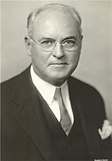
|
Martin Thomas Conboy Jr. | Democratic | ||
| May 16, 1935 – November 20, 1935 |
Francis W. H. Adams[d] | Democratic | ||||
| 38 | November 20, 1935 – December 1938 |
Lamar Hardy | Democratic | |||
| December 1938 – March 1939 |
Gregory Francis Noonan[e] | Democratic | ||||
| 39 | March 1939 – March 1941 |
John T. Cahill | Democratic | |||
| 40 | March 1941[f] – June 10, 1943 |
Mathias F. Correa | Democratic | |||
| June 10, 1943 – August 2, 1943 |
Howard F. Corcoran[g] | Democratic | ||||
| 41 | August 2, 1943 – October 9, 1944 |
James B. M. McNally | Democratic | |||
| 42 | October 9, 1944[h] – October 1949 |
John F. X. McGohey | Democratic | |||
| 43 | October 1949[i] – September 18, 1951 |

|
Irving Saypol | Democratic | Harry S. Truman | |
| 44 | September 18, 1951 – April 1, 1953 |
Myles J. Lane | Democratic | |||
| 45 | April 1, 1953 – July 11, 1955 |
J. Edward Lumbard | Republican[9] | Dwight D. Eisenhower | ||
| July 11, 1955 – September 1, 1955 |
Lloyd F. MacMahon[j] | Republican | ||||
| 46 | September 1, 1955 – July 9, 1958 |
Paul W. Williams | Republican | |||
| July 9, 1958 – 1959 |
Arthur H. Christy[k] | Republican | ||||
| 47 | 1959 – January 31, 1961 |
Samuel Hazard Gillespie Jr. | Republican | |||
| January 31, 1961 – April 18, 1961 |
Morton S. Robson[l] | Republican | John F. Kennedy | |||
| 48[m] | April 18, 1961 – January 16, 1970 |

|
Robert Morgenthau | Democratic | ||
| 49 | January 16, 1970 – June 4, 1973 |
Whitney North Seymour Jr. | Republican | Richard Nixon | ||
| 50 | June 4, 1973 – October 31, 1975 |
Paul J. Curran | Republican | |||
| October 31, 1975 – March 1, 1976 |
Thomas J. Cahill[n] | Republican | Gerald Ford | |||
| 51 | March 1, 1976 – March 2, 1980 |
Robert B. Fiske | Republican | |||
| March 3, 1980 – May 21, 1980 |
William M. Tendy[o] | Republican | Jimmy Carter | |||
| 52 | May 22, 1980 – June 3, 1983 |
John S. Martin Jr. | Democratic | |||
| 53 | June 3, 1983 – January 1, 1989 |

|
Rudy Giuliani | Republican | Ronald Reagan | |
| January 1, 1989 – October 16, 1989 |
Benito Romano[p] | Republican | George H. W. Bush | |||
| 54 | October 16, 1989 – May 31, 1993 |
Otto G. Obermaier | Republican | |||
| 55 | June 1, 1993 – January 7, 2002 |

|
Mary Jo White | Unaffiliated[10] | Bill Clinton | |
| 56 | January 7, 2002 – December 15, 2003 |

|
James Comey | Republican[11] | George W. Bush | |
| December 15, 2003 – September 6, 2005 |
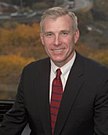
|
David N. Kelley[q] | Democratic | |||
| 57 | September 6, 2005 – December 1, 2008 |
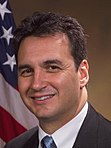
|
Michael J. Garcia | Republican | ||
| December 1, 2008 – August 13, 2009 |
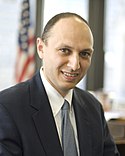
|
Lev Dassin[r] | Unaffiliated | |||
| 58 | August 13, 2009 – March 11, 2017 |
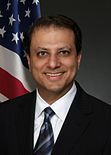
|
Preet Bharara | Democratic | Barack Obama | |
| March 11, 2017 – January 5, 2018 |

|
Joon Kim[s] | [data missing] | Donald Trump | ||
| January 5, 2018 – June 20, 2020 |

|
Geoffrey Berman[t] | Republican | |||
| June 20, 2020 – October 10, 2021 |

|
Audrey Strauss[u] | Democratic | |||
| 59 | October 10, 2021 – present |

|
Damian Williams | Democratic | Joe Biden | |
- ^ Henry C. Platt served as Acting U.S. Attorney during the vacancy
- ^ Robert E. Manley served as Acting U.S. Attorney during the vacancy
- ^ Thomas E. Dewey served as Acting U.S. Attorney during the vacancy
- ^ Francis W. H. Adams served as Acting U.S. Attorney during the vacancy
- ^ Gregory Francis Noonan served as Acting U.S. Attorney during the vacancy
- ^ Correa served as Acting U.S. Attorney from March to July 1941 before official confirmation to the post.
- ^ Howard F. Corcoran served as Acting U.S. Attorney during the vacancy
- ^ McGohey served as Acting U.S. Attorney from October 9, 1944, to January 1945 before official confirmation to the post.
- ^ Saypol served as Acting U.S. Attorney from October 1949 to April 13, 1950, before official confirmation to the post.
- ^ Lloyd F. McMahon served as interim U.S. Attorney during the vacancy
- ^ Arthur H. Christy served as Acting U.S. Attorney during the vacancy
- ^ Morton S. Robson served as Acting U.S. Attorney during the vacancy
- ^ From September 6 to November 20, 1962, Morgenthau resigned his position to run for Governor of New York. After he was defeated, John F. Kennedy re-appointed him as U.S. Attorney. In the interim, Vincent Lyons Broderick served as acting U.S. Attorney from September 5 to November 20, 1962.
- ^ Thomas J. Cahill served as Acting U.S. Attorney during the vacancy
- ^ William M. Tendy served as Acting U.S. Attorney during the vacancy
- ^ Benito Romano served as Acting U.S. Attorney during the vacancy
- ^ David N. Kelley served as interim U.S. Attorney during the vacancy
- ^ Lev Dassin served as interim U.S. Attorney during the vacancy
- ^ Joon Kim served as interim U.S. Attorney during the vacancy
- ^ Geoffrey Berman served as Interim U.S. Attorney from January 5 to April 25, 2018[12][13] and as court-appointed U.S. Attorney from April 25, 2018, to June 20, 2020[14][15][16][17]
- ^ Audrey Strauss served as Acting U.S. Attorney from June 20, 2020, until she was court-appointed U.S. Attorney on January 16, 2021
Notable assistants
[edit]- Michael F. Armstrong, lawyer
- Bob Arum, boxing promoter
- Debra A. Livingston, lawyer and judge
- Neil Barofsky, special inspector general overseeing the Troubled Asset Relief Program
- Bernard Bell, professor at Rutgers School of Law–Newark
- Maurene Comey, daughter of former FBI Director James Comey
- Thomas E. Dewey, Governor of New York and the unsuccessful Republican candidate for President in 1944 and 1948
- Eddie Eagan, former Olympic athlete
- Louis Freeh, former director of the Federal Bureau of Investigation
- Patrick Fitzgerald, United States Attorney for the Northern District of Illinois
- Felix Frankfurter, Associate Justice of the Supreme Court of the United States
- John Marshall Harlan II, associate justice, Supreme Court of the United States
- Elie Honig, lawyer and CNN Senior Legal Analyst
- Arthur L. Liman, criminal defense attorney
- Robert J. McGuire, former New York City Police Commissioner
- Michael Mukasey, former United States Attorney General
- Thomas Francis Murphy, federal prosecutor and judge in New York City; prosecutor in the two perjury trials of Alger Hiss
- Mary Grace Quackenbos, first woman to hold this post in the United States
- Charles Rangel, U.S. Representative from Harlem
- Henry Dwight Sedgwick, lawyer and author
- Franklin A. Thomas, former director of the Ford Foundation
- Maya Wiley (born 1964), civil rights activist and lawyer, 2021 mayoral candidate for New York City
In popular culture
[edit]Television
[edit]The Showtime drama series Billions is loosely based on Preet Bharara's prosecution of SAC Capital and other hedge funds.[18]
The ABC legal drama For the People depicts new defense attorneys and prosecutors working in the Southern District of New York.
The 2020 Netflix series Fear City: New York vs The Mafia documents the work of the Federal Bureau of Investigation and the Southern District of New York against the Five Families of the Italian American Mafia in the 1980s.
References
[edit]- ^ Weiser, Benjamin; Rashbaum, William K. (March 10, 2017). "With Preet Bharara's Dismissal, Storied Office Loses Its Top Fighter". New York Times.
In past presidential transitions, the storied office, long known to be so independent of Washington that some people referred to it as the Sovereign District of New York, has in large measure moved forward unaffected by politics.
- ^ Beale, Sara Sun (2011). "What Are the Rules if Everybody Wants to Play?". In Barkow, Anthony S.; Barkow, Rachel E. (eds.). Prosecutors in the Boardroom: Using Criminal Law to Regulate Corporate conduct. NYU Press. p. 206. ISBN 9780814787038.
Finally, in some multijurisdictional cases there have been turf battles rather than cooperation. For example, the U.S. Attorney's Office in the Southern District of New York ... Press accounts have noted the perception that the 'Sovereign District of New York' ... doesn't necessar[il]y play well with others.
- ^ McDermott, Terry; Meyer, Josh (2012). The Hunt for KSM: Inside the Pursuit and Takedown of the Real 9/11 Mastermind, Khalid Sheikh Mohammed. Little, Brown. p. PT42. ISBN 9780316202732.
This was sometimes referred to—mockingly, but enviously, too—as the Sovereign District of New York. It was in many ways a separate fiefdom from the rest of the Bureau, creating its own rules and procedures. The agent in charge of the office, unlike all but one other agent in charge, held the rank of an assistant director of the entire FBI.
- ^ Ragavan, Chitra (March 26, 2001). "The pardon buck stops in New York: U.S. Attorney Mary Jo White takes the lead". U.S. News & World Report. Vol. 130, no. 12. p. 24.
The Bush administration has left the answer largely in the hands of White, a registered independent, whose office, because of its legendary independence and tenacity, is known as the 'sovereign district'.
- ^ Relman, Eliza (May 15, 2017). "'History will judge this moment': The 'Sheriff of Wall Street' urges Republican lawmakers to hold Trump accountable". Business Insider. Retrieved March 10, 2020.
- ^ Berthelsen, Christian (October 11, 2021). "Wall Street Enforcer Becomes First Black U.S. Attorney for Manhattan". Bloomberg.com. Retrieved October 12, 2021.
- ^ Organization and Operation, U.S. Attorney's Office
- ^ "Southern District of New York". www.justice.gov. March 10, 2020. Retrieved March 10, 2020.
- ^ "History". New York Young Republican Club. Retrieved November 15, 2023.
- ^ 2013 Speech to the 14th Annual A.A. Sommer, Jr. Corporate Securities and Financial Law Lecture, Fordham Law School SEC. (October 3, 2013). Retrieved December 14, 2014
- ^ Krieg, Gregory (May 9, 2017). "Who is James Comey: 7 things to know about the fired FBI director". CNN. Retrieved July 8, 2017.
- ^ "Statement Of U.S. Attorney Geoffrey S. Berman On Appointment By Chief Judge" (Press release). April 25, 2018. Retrieved September 4, 2018.
- ^ Weiser, Benjamin (August 9, 2009). "For Manhattan's Next U.S. Attorney, Politics and Prosecution Don't Mix". The New York Times.
- ^ Orden, Erica; Perez, Evan; Prokupecz, Shimon (October 12, 2019). "Manhattan US attorney in the spotlight with another high profile investigation of Trump's inner circle". CNN. Retrieved June 7, 2020.
- ^ Scannell, Kara (March 9, 2020). "US Attorney Geoffrey Berman asserts independence from Justice Department". CNN. Retrieved June 7, 2020.
- ^ Erica Orden; Kara Scannell (February 15, 2020). "Attorney general's actions spark outrage and unease among US prosecutors". CNN. Retrieved June 7, 2020.
- ^ Spinelli, Dan (February 15, 2020). "Report: Barr Protected Turkish Bank From Prosecution to Appease Erdogan". Mother Jones. Retrieved June 7, 2020.
- ^ Tallerico, Brian (April 2, 2017). "Billions Recap: Agents of Chaos". Vulture. Retrieved April 25, 2017.


